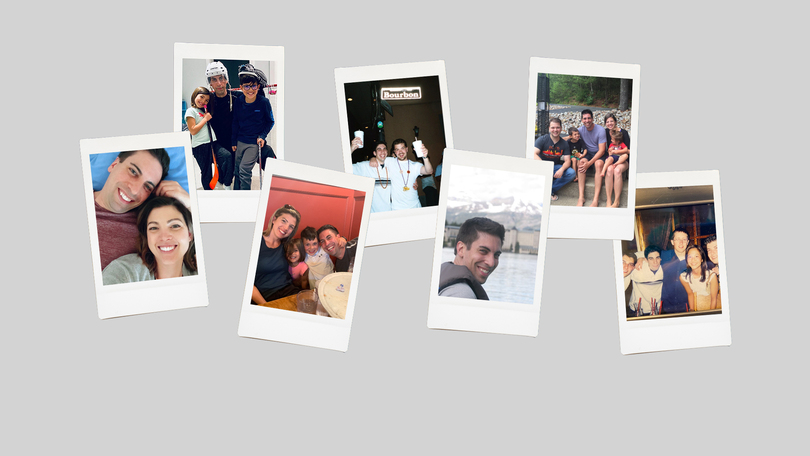Chris believes he was part of that 66% in that first trial — the ones who got the treatment to limit their limitations. But ALS isn’t always predictable, and new struggles pop up. Near the end of last year, a feeding tube was inserted in Chris’ stomach. The days leading up to the surgery were some of the last times Chris could eat certain foods.
“I’m always trying to make people aware, like, ‘No, this hasn’t been perfect for us,’” Kelsie said. “It’s been good, but it’s not been perfect.”
Bishop, Passan and Rothstein recalled that Chris had a particularly tough Thanksgiving when it came to meals. The four former D.O. editors rejuvenated a group chat in late 2019 after Chris’ condition went public. It became a hotbed of running jokes and screenshots of old emails. On one particular November day, they called up Bow Valley Ranche Restaurant in Calgary and ordered Snow one of everything on the menu. When the food arrived, Chris recalled how excited his kids were. There’s been deliveries of pizza, Italian food and $100 of pastries from the three since.
Like most, the three of them haven’t been able to see the Snows. Some summers, Levinthal and Curtis met at Chris’ family lake house in New Hampshire. Visits like that reminded Wojcik, who made the trip for one day, how good of a father and husband Chris was.
Levinthal got to spend quality time with his godson. It was just six weeks before when the thought crossed Levinthal’s mind that his best friend might have six months to live. But at some point — maybe when Chris drove the boat, or maybe when he tossed around the football — Levinthal realized Snow’s battle could have a stopping point.
• • •
F
or Chris, the best days are now when he’s on the ice, skating past five opposing players and shooting left-handed. They’re the Sunday mornings where he takes Cohen to baseball and the two lefties play catch. “My good days are when no one else can tell I have ALS,” he concludes.
Then, there are the challenging days. Chris says there are two types. One is where he’s going through some sort of physical loss, but “nothing excruciating.” The medication isn’t fully working, he’ll think on those days. The other type is when the changes to his face become apparent. “The way my face and mouth are right now, I can’t articulate nearly as well,” he said. When Chris is talking and wants to interject with a quick joke, he doesn’t know if he can pull it off because he has to think of the word ahead of time.
One of the things you realize is you feel really comfortable around certain people you’ve known for a long time because they look at you like you aren’t different, that you’ve changed, that you lost things physically
Chris SnowThose days, some might even call the worst moments, aren’t even that bad in Chris’ eyes. When his body isn’t functioning like it was, Chris reminds himself he’s still alive almost two years after his initial diagnosis. When he needs to lie down more than he wants or notices more changes to himself, Chris thinks of his family history, his treatment, his wife and kids.
“If I had to choose what things to lose before and I got a whole menu, I would choose all the things I’ve lost and all the things I haven’t because I can still do basically everything I want to do,” Chris said.
There are a lot more good days ahead. That didn’t always feel possible. Not just to Chris, but to those closest to him.
To his friends who haven’t seen him since COVID-19 or even years before that, their next great days align with Chris’. Where conversations aren’t limited to cell towers and group chats. Where a group of guys tell the same inside jokes that cracked them up when they were 20-something. It’s the talks of marriage, and losing hair, and not being able to drink as much as they used to.
“We weren’t super nostalgic for a long time,” Bishop said. “We are now.”
— 30 —
Banner illustration by Talia Trackim | Senior Staff Designer










